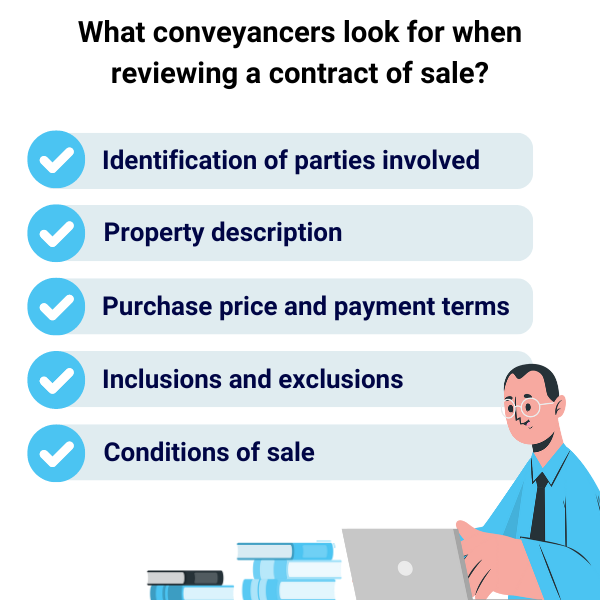In every property transaction, the contract of sale outlines the specific terms and conditions that will apply once it has been signed by both parties. Buyers and sellers are always advised to ensure that they fully understand what is covered in the contract of sale before signing anything.
To that end, parties often engage a conveyancer to conduct a thorough review of the contract of sale to protect their own interests. Here’s an in-depth look at how long it can take for a conveyancer to review a contract, and what to expect during and after the reviewing stage.
How long will it take for a conveyancer to review a contract of sale?
Experienced conveyancers who have a firm grasp of what to look for in a contract of sale will typically be able to finish reviewing a standard residential property contract within a short period of 1-3 days.
Not all contracts are equal – it will depend on how straightforward the contract of sale and transaction is in order to get an idea of how long a conveyancer will take to review it.
Non-standard contracts that include special conditions or complicated ownership arrangements may require a greater degree of scrutiny that will add to the time needed for a more comprehensive review.
What conveyancers look for when reviewing a contract of sale?
Identification of parties involved
Conveyancers ensure that the listed identities of the buyer and seller within the contract are accurately reflected. This includes checking names, addresses, and legal statuses — any error, even misspellings can end up causing significant and inconvenient delays to the transaction.
Property description
A conveyancer will examine the description of the property in the contract to ensure it accurately reflects the property being sold. This includes the address, legal description, land and zoning boundaries. Any discrepancies in the property description can lead to legal disputes or issues with the title transfer.
Purchase price and payment terms
The agreed-upon purchase price and payment terms are important to both the buying and selling parties, especially since special conditions can sometimes be attached to the payment, such as deposits, instalment plans, or other financing arrangements. These will be reviewed by a conveyancer to ensure they are clearly stated and acceptable to both parties.
Inclusions and exclusions
Properties are sometimes sold with a collection of fixtures, fittings, and appliances, which are referred to as inclusions. Likewise, similar items within the property at the time of viewing that will be excluded from the sale are known as exclusions.
Conveyancers look at a detailed list of these inclusions and exclusions within the contract of sale to clarify what is or isn’t part of the property transaction so as to avoid potential disputes later on.
Conditions of sale
The contract of sale will often contain certain conditions that must be met for the transaction to proceed. Conveyancers will review these conditions carefully to ensure that they are within reason and acceptable to their clients. Examples of conditions of sale include:
- Subject to finance, where the sale is contingent upon the buyer obtaining financing approval from their lender.
- Building and pest inspections, where the sale is dependent on the property passing building and pest inspections.
- Settlement date, indicating the date by which the sale must be completed.
- Special conditions, such as the requirement for certain repairs to be completed before settlement.
Can I review a contract of sale without a conveyancer?
A contract of sale is a robust legal document that requires a keen understanding of legal terms and the property transaction process. It’s generally not advisable for individuals to sign off on a contract without the support of an expert conveyancer.
Reviewing a contract without having specialised conveyancing expertise will expose parties to unnecessary risks that may end up having costly consequences, from missing out on hidden details about the property, to having the entire sale terminated.
What happens after a contract of sale has been reviewed?
After a contract of sale has been reviewed by a conveyancer, they will usually provide their clients with an overview of any outstanding issues or discrepancies they have found within it.
From there, the conveyancer will work closely with clients to address these issues, communicating with the other party if necessary to propose amendments to the contract or to clarify certain details.
Once all issues have been addressed and the contract is acceptable to the client, conveyancers will finalise the contract of sale and notify the client that the contract can be signed. What follows is the rest of the preparation process for the conveyancing process, from the payment for the deposit amount, and the settlement date.
At Entry Conveyancing, we have a team of conveyancers across Melbourne, Sydney, and Brisbane. We can provide a comprehensive review of your contract of sale within 48 business hours or within two hours (including weekends) for urgent requests. Even if you don’t have the contract yet, our conveyancers work with you to provide expert advice to prepare you for the rest of the settlement process.






